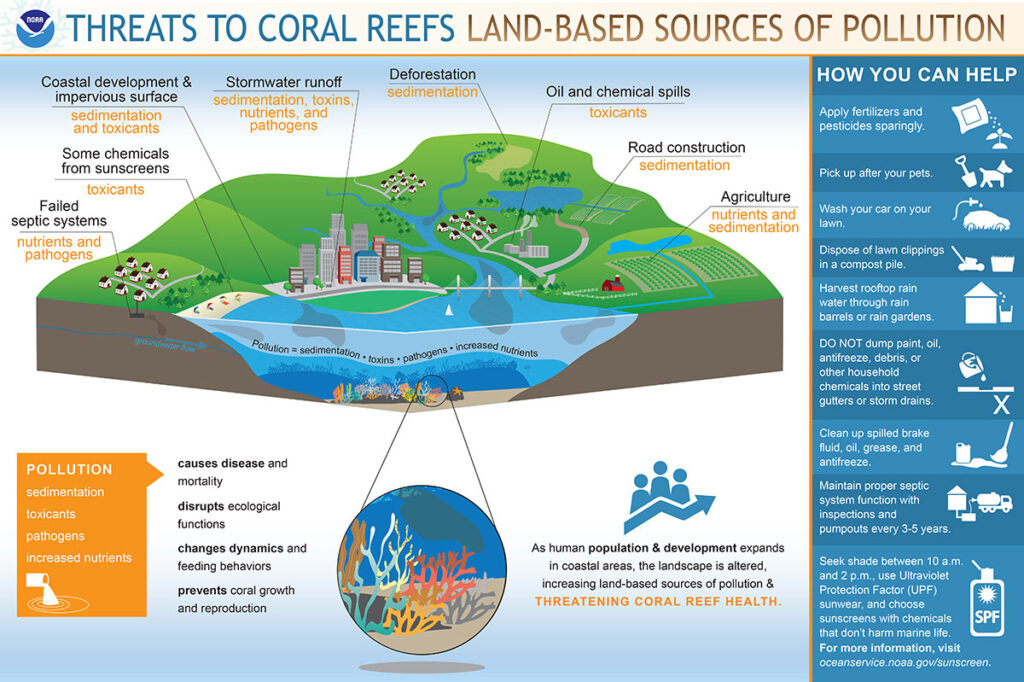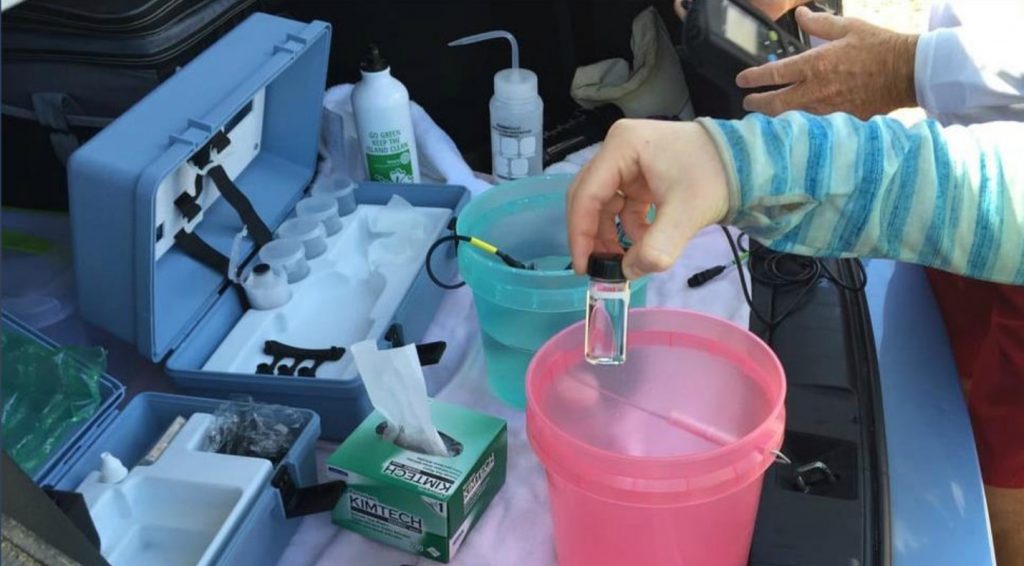Pollution
Traditionally, impacts from wastewater pollution have been associated with human health, but the detrimental effects of wastewater pollution on marine life–and the indirect impacts they have on people–cannot be overlooked. Wastewater transports pathogens, nutrients, contaminants, and solids into the ocean that can cause coral bleaching and disease and mortality for coral, fish, and shellfish. Wastewater pollution can also alter ocean temperature, pH, salinity, and oxygen levels disrupting biological processes and physical environments essential to marine life.

Land-based sources of pollution as threats to coral reefs. Photo © NOAA 2023
Other sources of pollution to coral reefs include land-based pollution associated with human activities such as agriculture, mining and coastal development leading to the discharge or leaching of harmful sediments, pollutants, and nutrients. Marine-based pollution associated with commercial, recreational, and passenger vessels can also threaten reefs by discharging contaminated bilge water, fuel, raw sewage, and solid waste, and by spreading invasive species.
Socio-economic Impacts
Globally, the direct impacts of ocean wastewater pollution on people costs an estimated $16.4 billion (2018 USD) in annual economic losses. ref
Pathogens from human waste spread diseases to people through contaminated drinking water, food grown in contaminated soils, seafood harvested from contaminated waters, and bathing and recreating in polluted waters. ref These may lead to infectious diseases, increases in antibiotic resistance, ref poisoning through heavy metals, and contaminants of emerging concern (CECs).
Management Strategies
Research shows that coral reefs are more resilient in areas where land-based pollution is low. These areas usually recover faster and with more biodiversity than areas that are impacted by poor water quality. ref Appropriate land-use practices are critical for the management of watersheds to ensure that the transport of sediment, nutrients, and other pollutants to coral reefs is minimized. Engaging in watershed management strategies and watershed planning is a crucial responsibility for coral reef managers.

The Hui O Ka Wai Ola (Association Of The Living Waters) citizen science water quality sampling program measures coastal waters for pollutants that can harm coral reefs and human health in Hawai‘i. Samples and data collected are used for decision making around water quality standards and management plans. Photo © Bill Rathfon
The major types of strategies that coral reef managers can get involved in to reduce watershed impacts on coral reefs include:
- Erosion/sediment reduction — Including revegetation of riparian (streamside) areas, contour tilling, terracing, rotational grazing/cropping, avoiding overstocking of grazing animals, vegetated swales, road drainage and sediment traps (settlement ponds, wetlands, etc.). Planning and design that maintains the natural hydrologic regime can avoid many erosion problems.
- Sewage and stormwater management — In some instances, extending discharge points further offshore or into deeper water can reduce local impacts through greater dilution. Where there are no centralized treatment services, councils and homeowners can be assisted/encouraged to maintain septic systems and convert cesspools to septic systems whenever possible. The Bonaire case study provides an example of this watershed strategy.
- Reducing chemical inputs from agriculture — Coral reef mangers can help watershed managers work with landholders to understand the financial and economic implications of inefficient fertilizer use and provide guidance on optimal fertilizer types and application techniques.
- Community engagement — Coral reef managers can increase the constituency for improved watershed management through outreach and education programs targeting reef stakeholders. Monitoring programs or participatory management activities (such as watershed cleanup days or ‘adopt-a-reef’ programs) that involve community members are a great way to engage stakeholders and create a sense of stewardship.
